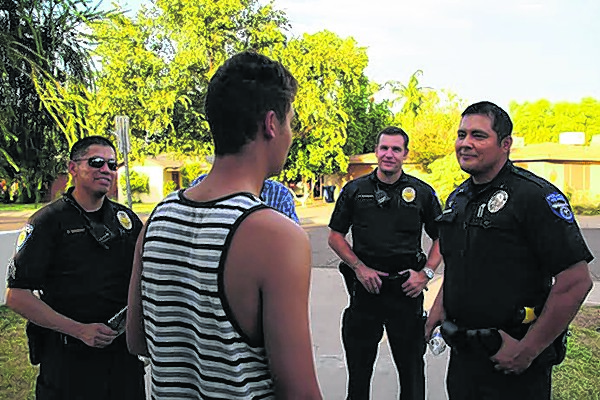
Orlando. Istanbul. San Bernadino. Paris. As terror attacks become more commonplace, the oft-repeated catchphrase “See something, say something” has Tempe and West Chandler residents wondering: What exactly does it mean?
Don Black, a former El Paso, Texas, police sergeant, was born and raised in Chandler but spent 30 years living and working in Texas. He returned to West Chandler with his family two years ago after retiring from the police department and sat down with Wrangler News to discuss the “See something, say something” national campaign.
Black framed the discussion by recalling the terror attacks of 9/11 and the heightened state of alert across the country as police agencies hunkered down.
“A lot of us were posted at crucial sites throughout the city. We all had the same concerns—things like water treatment plants, anything that would be a value to the well-being of the community,” Black said.
On 9/11, citizens reported that they had observed someone tampering with the city’s water-treatment facility. The Federal Bureau of Investigation contacted the El Paso police department.
“The locks were cut,” Black said of the incident. “That’s an example of why people should call.” Alerting law enforcement of suspicious activity should not be thought of as a nuisance or overreaction, Black said.
“People think, ‘It’s probably just kids messing around,’ but as public safety employees, that’s our job. You’re not going to be bothering the police by picking up the telephone and saying something just doesn’t seem right. That’s what the police get paid to do,” Black said.
So what kinds of things should arouse suspicion?
If you’re out in a public area, especially large gatherings, Black said, be on the lookout for unattended items such as a suitcase, backpack, briefcase or box—anything that might contain potentially hazardous material.
“If you see something out of place in a public area that has the potential to be dangerous, (the authorities) want you to call so they can at least check it out,” Black said.
“The best case scenario is we get there, we check it out, and it’s safe.”
As a field supervisor for 11 years in a community close to the border with Mexico, he said he was frequently dispatched on such calls.
“Many times we responded because of a package that was left on the international bridge,” Black said.
“Most of the time, it was nothing, but you know, is there a price for human life?
You’ve got people out there on duty being paid to perform a certain job by the taxpayers who expect you to protect them.”
It only takes one package, one person to wreak destruction. Law enforcement relies on citizens to keep their eyes and ears open.
That was a point hammered home by Molly Enright, a community relations officer with the Tempe Police Department.
“Community partnerships are incredibly important because the number of officers we have simply cannot be everywhere all the time,” Enright said. In a city of 165,000 where the population roughly doubles each day as people arrive for work, school or other business, calls alerting police to suspicious behavior are extremely helpful, she said.
“I can’t tell you the number of times that residents have called and said, ‘We don’t want to bother the police, but we saw this person in the alley’ or ‘We heard something’ or ‘My neighbor told me something,’ and as it turns out that has led to a significant piece of intelligence that helped us, whether it was drug trafficking, a domestic violence situation or planning for a terrorist event,” Enright said.
Though she said she is not aware of any thwarted terrorist attacks, she said, “We get information on a daily basis from residents that helps prevent crime that otherwise would have likely occurred.”
“Prompt and detailed reporting of suspicious activities can help prevent violent crimes or terrorist attacks.
“If you see suspicious activity, please report it to your local law enforcement department,” the U.S. Department of Homeland Security website states.
Information: dhs.gov
Tempe police non-emergency number: 480-350-8311
Chandler police non-emergency number: 480-782-4130
— Joyce Coronel

